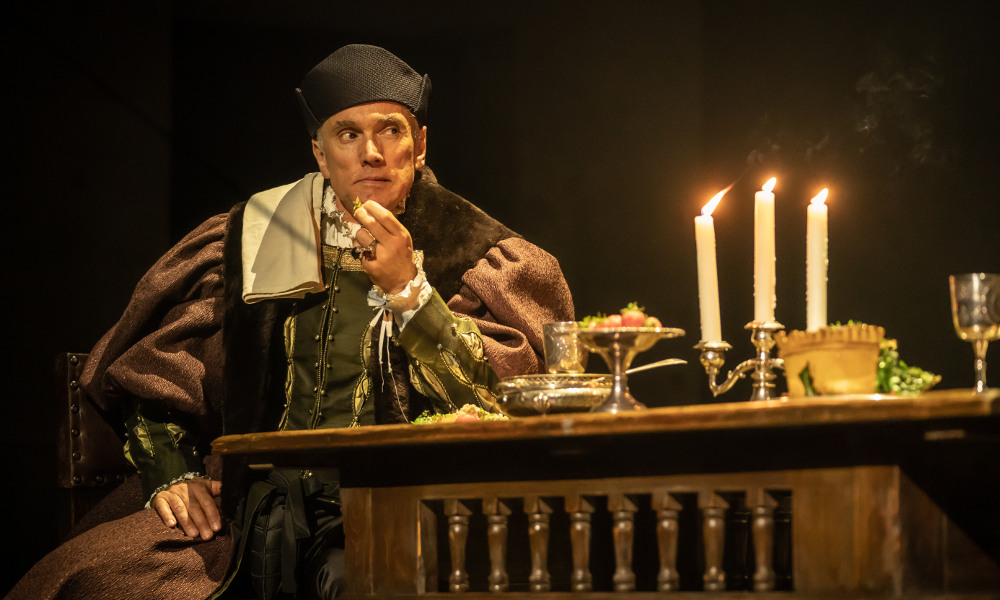
Review: The Mirror and the Light, Gielgud Theatre
Review: The Mirror and the Light, Gielgud Theatre
Jenny Booth is seriously impressed by this stage adaptation of Hilary Mantel’s third novel based on the life of Thomas Cromwell
⭐️⭐️⭐️⭐️⭐️
The day of judgement has finally arrived for Hilary Mantel’s baseborn hero, Thomas Cromwell. Fallen from the king’s grace, the great officer of state and royal fixer extraordinaire is now stripped of his power, locked in the Tower of London while his enemies come to gloat and divide the spoils. Mantel’s double-Booker-prizewinning trilogy of historical novels are not really about Cromwell: instead, they appear to inhabit him, bringing the restless genius of his mind to life. And the inside of Cromwell’s mind now is a dark and introspective place, haunted by ghosts of his past as he runs over where he went wrong.
Mantel’s stage adaptation of The Mirror And The Light opens with a soundtrack of massive subterranean rumbling: symbolically, the pre-shocks of the earthquake that is about to sweep Cromwell away. Despite this ominous background, Cromwell at first seems confident. The king will relent, he claims, all will go back to normal. Even his enemies appear wary. Then the action snaps back in time to the days after Anne Boleyn’s execution, and the audience’s foreboding starts to grow.
Helplessly, we watch as Cromwell – apparently at the height of powers – makes uncharacteristic mistakes, misjudging the mood of the king. He is juggling so much: dissolving the monasteries to bring in cash for the crown, pitting himself politically against powerful, dangerous players like the King of France, the Holy Roman Emperor, Mary Tudor, the Duke of Norfolk, Bishop Stephen Gardiner. He is also working to establish his dynasty, setting up his son Gregory in a marriage to the new queen’s sister. But he has failed to keep his eye fixed on the most lethal player of them all – his own monarch. Henry VIII has started to see through his efforts to manipulate him (“prostrate at your feet I fall”). By trapping Henry in a disastrous marriage and failing to extricate him, Cromwell fatally offends the king and misjudges the extent of Henry’s pique. The scene of his arrest in the king’s council is a desperate, brutal brawl, a throwback to Cromwell’s streetfighting youth.
The play is a tragedy in the classical sense, the downfall of an exalted man causing pity and fear. It is darker and more sparely written than its predecessors, Wolf Hall and Bring Up The Bodies. The action is pared back so that every element helps to rush Cromwell towards his fate, and this adds to its power. Mantel, who was present in the audience and appeared vividly interested and caught up in the production, has honed her craft of translating her stories to the stage. In the programme notes she praises the influence of co-writer Ben Miles, the actor who has brought Cromwell so convincingly to life in all three installments, saying it encouraged her “to explore Cromwell’s interiority”. With the action no longer in the round as before but enclosed behind a proscenium arch, the towering dimensions of Christopher Oram’s set add a sense of claustrophobia, and offer walkways where the gaudily lit ghosts of Cromwell’s past can stalk.
Director Jeremy Herrin, who has worked with Mantel on all three Cromwell plays, permits moments of comedy – many of them supplied by Nicholas Boulton, whose Duke of Suffolk has a Blackadder-ish air. There are moments of stark beauty, including when Melissa Allan (who is effective and highly watchable as Mary Tudor) begins to sing a lament. And there are moments of extreme menace. There is a brief, impressionistic scene towards the end when the lights turn dim blue and the rest of the cast, wearing wolf masks, crouch around the kneeling Cromwell; then they part a little, as out of the blackness stalks the erect figure of Henry (Nathaniel Parker, just brilliant) wearing the mask of a royal lion.
I could complain that the Duke of Norfolk is not quite as he appears in the books, but that would miss the point – as Mantel says, “you can’t really ‘adapt’ a novel – you must reframe the story for the stage, make it visual”. Nick Woodeson’s haughty and venomous Duke fits the stage. It was good to see such a number of young actors making their West End debuts in named roles, particularly Rosanna Adams whose disgruntled Anne of Cleeves enlivened the second half. It is the sign of an excellent production that the action was so gripping that time passed in a flash.
Running until 23 January, 2022. Gielgud Theatre. Shaftesbury Avenue.
Follow Jenny on Twitter @culturevult






